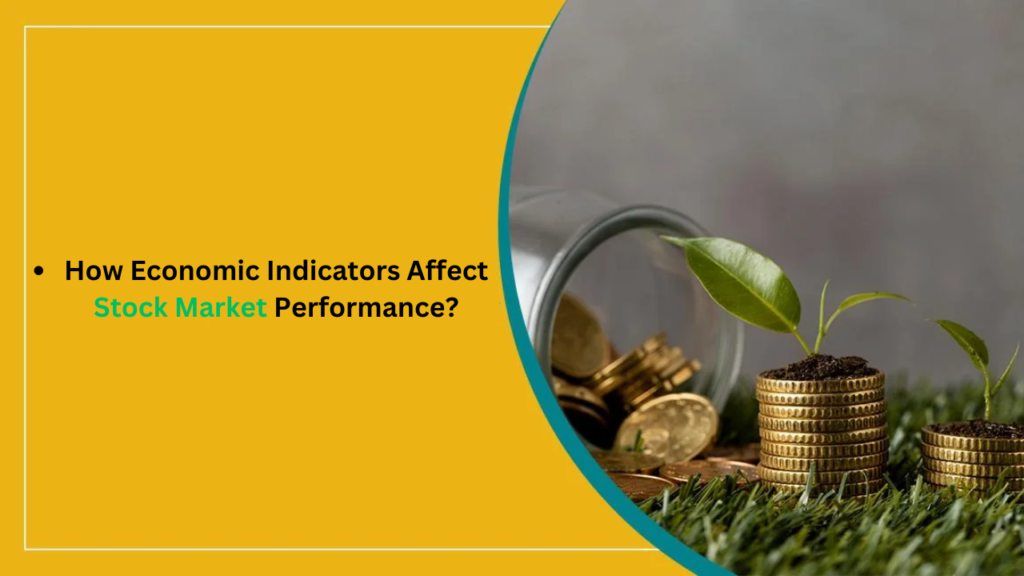How Economic Indicators Affect Stock Market Performance?
The behavior of the stock market is closely related to several economic statistics. Understanding these relationships helps investors to predict market fluctuations and make wise decisions. Using leading economic indicators, this paper investigates the relationship between GDP growth rates and stock market indices in India over the past 20 years; it also looks at the effect of inflation rates on several sectors, analyzes market reactions to important economic events, and addresses predictive models.Relationship between indices of the stock market and GDP growth ratesA nation’s economic situation is much judged by its gross domestic product (GDP). In India, stock market performance and GDP growth have shown notable relationship. Over the previous two decades, times of strong GDP growth have usually matched optimistic stock market trends.

A few historical patterns:
2003–2008: India’s GDP grew somewhat steadily, averaging about 8% yearly. The BSE Sensex surged from about 3,000 points in 2003 to over 20,000 points by 2008 during this era.
2008–2009: The global financial crisis caused a dramatic drop in GDP growth as well as a matching stock market collapse. In 2008–2009 the GDP growth rate plummeted to 3.1%; the Sensex sank by more than 50%.
2010–2019: A time of steady development and recovery with GDP averaging roughly 7%. Reaching new highs and always performing consistently, the Sensex reflected this pattern.
Certain historical records
Consumer Goods: High inflation reduces buying power, so lowering consumer expenditure. For instance, consumer products businesses saw decreased stock values during high inflation in 2008 and 2013.
Financial Services:
Interest rate changes brought on by inflation influence banks and other financial institutions. Rising inflation usually results in higher interest rates, which would help banks’ net interest margins but might also impede loan development. During high inflation times, as those of 2011–2013, the banking industry shown varied success.
Real Estate:
Inflation affects the real estate industry by raising borrowing and construction materials’ costs. The industry suffered from inflationary surges in 2008 and 2010.
Technology:
Usually less impacted by inflation since its reliance on raw resources reduces its influence. India’s IT industry has shown fortitude under inflationary times, preserving a steady increase.
Models of Market Reactions to Significant Economic Events
Analyzing how the stock market reacts to significant economic events offers an important understanding of the behavior of the market.
2008 Financial Crisis Impact:
The crisis badly affected India’s economy as it resulted in a worldwide economic slowdown. From almost 20,000 points in January 2008, the Sensex dropped to about 9,000 points by October of that same year.
Policy actions and government stimulus programs helped to steady the economy. The Sensex started to rebound by mid-2009 and by 2010 it was back to pre-crisis.
COVID-19 Pandemic Impact: The epidemic brought unheard-of financial disturbance. From over 41,000 points in January 2020 to about 25,000 points in March 2020 the Sensex dropped.
Thanks to aggressive monetary policy, significant fiscal stimulus, and a quick immunization campaign, the market recovered. The Sensex had recovered to pre-pandemic levels by the end of 2020; it reached new highs in 2021 and the trend is still running.
Forecasting Models Applied Leading Economic Indicators
By examining major economic indicators including industrial production, interest rates, and consumer confidence, predictive models can assist project stock market developments.
A rising Industrial Production Index (IPI) points to economic growth and usually results in positive market movements.
Reduced borrowing costs and increased investment resulting from lower interest rates help the stock market by way of their impact on behavior. High consumer confidence indicates strong consumer spending, so promoting economic development and stock market performance.
Conclusion :
Though complicated, investors must grasp the interaction between stock market performance and economic data. Analyzing past data and using predictive models helps investors to get important insights and guide their decisions. The way the Indian stock market responded to inflation, GDP increase, and major economic events emphasizes how crucial these metrics are in determining market direction.
